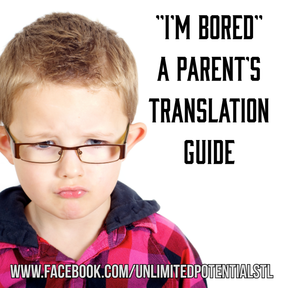 By Emily Kircher-Morris, LPC If I had a dime for every time a child or student told me that they were bored or that something was boring, I'd have enough money for a boring trip to Mexico with my husband. (Wouldn't boring be absolutely wonderful? When did my life go from abhorring boredom to it becoming a life goal? Anyway, I digress...) What I've found through many conversations with children, teens, and parents is that the phrase "I'm bored," or, "This is boring," often doesn't mean what it seems. Here is a handy guide for parents and teachers to understand the possible alternative meanings to complaints of boredom. "I don't have anything to do." Self-regulation is an executive functioning skill and this skill develops based on a child's maturity level. A child may have a million toys, a trillion games, and three-quarters of a ton of arts and crafts supplies. But, thinking about available options, prioritizing which seems the most interesting, and initiating the task are directly related to executive functioning skills and a child may need some ways to help figure out what they want to do. Creating a "menu" of options from which a child can choose or creating a "grab bag" with ideas of activities listed on individual pieces of paper can help take the decision-making out of the choice. "This isn't fun." Helping to clean the house typically isn't exactly a thrill a minute. However, if a child is busy and engaged, they aren't typically "bored." When a child complains of boredom in a school setting because a task isn't fun, parents may misinterpret it as the child saying they aren't challenged. Unfortunately, some academic tasks simply aren't all that fun, no matter what the teacher tries. Perseverance through a task that isn't fun but is necessary isn't easy for adults; helping children focus on the benefits of the outcome and monitoring their progress can help them to build this skill. "This isn't challenging enough." When a child fails to complete schoolwork and complains of being bored in class, it is possible that the work isn't challenging enough. (I should note, though, that many times the complaint is more closely related to one of the two reasons listed above.) This can go in two different directions: In one situation, the child begins acting out and getting in trouble. In the second situation, the child politely sits and completes work, compliant, bored, and not learning. Advocating for your child with the teacher for appropriate work is a necessary step for parents to take if this is the case. "This is too hard." The flip side of not being challenging enough is when a child finds a task too difficult. Sometimes a child doesn't even realize that they don't understand; they just know they don't want to attempt the task. When investigating the root cause of the "I'm bored" refrain, ask the child to restate to the task they are supposed to complete. If they are unable to explain, further instruction, modified requirements, or other accommodations may be appropriate. "I'm lonely." Parenting the child who needs to be with people can be exhausting. Suggestion after suggestion of activity may fall flat if a child is complaining of boredom because they are simply lonely. Recognize the child's need and dedicate time to "fill their bucket" with undivided attention. Negotiate with siblings who may prefer more alone time to engage with the brother or sister who thrives on attention. "I'm generally unhappy and don't know how to fix it." Sometimes kids just aren't happy. They often lack the emotional vocabulary to share how they are really feeling. Perhaps they are feeling worried, defeated, or excluded. "I'm bored" becomes a catchall for these uncomfortable feelings. Digging deeper to see what other emotions are beneath the boredom is key. It is also important to note that children and teens can be susceptible to depression and a child who is frequently uninterested in activities that at one time were engaging can be a warning sign that the child is depressed. "Nothing seems interesting." And finally, when all other options are exhausted, boredom may just be boredeom. Although there are options, none of them seem enticing. My Aunt Francine use to tell us, with unimpressed frankness, "You're not bored; you're boring." The lesson she was hoping to teach is that boredom is easily vanquished with a little creativity and imagination. Teaching kids ways to play with situations in their minds and amuse themselves in boring situations is an excellent skill to learn.
3 Comments
 By Caitlin Winkler, PLPC The excitement of a new baby compares to almost nothing else in this world. Parents dream of the baby growing inside: what he or she might look like, the type of personality the little one may have, and all the wonderful experiences to come with the bundle of joy. What happens when what we picture as the perfect, most wonderful time of our lives turns out not to live up to our expectations? Pregnancy and postpartum mental health issues are more common than you might think. Anxiety, depression, a heavy sense of being overwhelmed, and even grief are normal after the birth of a child. There are times, however, when these feelings are more than just passing emotions. About 15% of women experience some sort of clinical mental health issue during this stage of life. These conditions can begin during pregnancy, immediately after giving birth, or within the first few months after the arrival of your new baby. They may last a few weeks or even up to a year. 5 signs you may be dealing with postpartum anxiety or depression:
Many parents can write off the intense emotions as "just adjusting" or "completely normal." Though this can be true, don't be afraid to ask your doctor or counselor questions. A new baby is a wonderful thing, but the physical, emotional, and mental demands can be extremely taxing. Seek out help! This is best for you, your partner, and your child! Self-assessment tool (Edinburgh Postnatal Depression Scale): https://psychology-tools.com/epds/ Learn more from the American Psychological Association: http://www.apa.org/pi/women/resources/reports/postpartum-depression.aspx-- Caitlin Winkler is a Provisionally Licensed Professional Counselor at Unlimited Potential Counseling & Education Center in O’Fallon. Caitlin is under the clinical supervision of Emily Kircher-Morris, LPC (MO #2012026754). By Caitlin Winkler, PLPC Becoming a more positive parent does not mean always looking on the bright side and sugar-coating life with your child. It doesn't have to be silly, corny, or uncomfortable. It also does not mean never telling your child "no." Again, there is a time and place for using these words and phrases. This style focuses your attention on the positive actions, behaviors, and thoughts your child exhibits more than the negative. It involves making positively-worded statements toward your child significantly more often than negatively worded statements. Using these toward your child encourages them to continue a wanted behavior and still maintains your authority. To break it down, positive parenting involves using positive praises and positive directives. Positive praises are used at any time. They are meant to reinforce wanted behaviors and words. Positive directives (or called positive opposites) teach your child what actions you are wanting them to have. Continuing the list from the previous post, here are six more ideas of how you can be a more positive parent to your son or daughter. 6. Be aware of positive opposites. Positive opposites teach your child what TO DO instead of limiting the message about what not to do. Instead of saying "Don't hit or kick other kids" the positive opposite would be "Keep your hands and feet to yourself." Another example would be, "Quit whining and fussing" turns into "Use your words." 7. Keep statements clear and concise. If you are giving a positively worded directive to your child, be clear about what is expected while keeping your directions from turning into a lecture. 8. Stick with it and be flexible. If this is new in your household, it may take some time for everyone to adjust. Keep working with your child and you will see them change as well as your relationship. And be flexible. Some kids are motivated by a simple "Great job cleaning your room today" while others need high-fives, positive praises, and other reinforcements. Think of what motivates your kid and use that. 9. When providing positive directives, keep your voice firm and calm. Communicate to your child you mean business while also being in control of your own words and actions. Lashing out in anger completely erases the positive message. Children learn by example, and it starts with the adults in his or her world. 10. Becoming a more positive parent seems to be geared toward younger children, however, this style can be used with older kids as well. Adjust as you see fit, but the basic ideas are the same! 11. Seek advice and help from friends, family, and professionals. No one is perfect and has this whole parenting thing figured out. It is a challenge! Reach out to people when you need some encouragement, tips, and help. Caitlin Winkler is a Provisionally Licensed Professional Counselor at Unlimited Potential Counseling & Education Center in O’Fallon. Caitlin is under the clinical supervision of Emily Kircher-Morris, LPC (MO #2012026754).
|
Archives
August 2021
Categories
All
|
 RSS Feed
RSS Feed